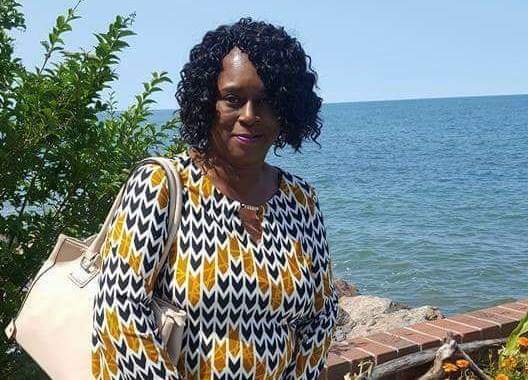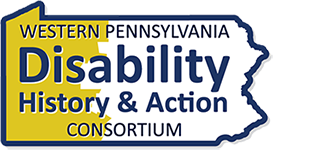By: Jessica C. Neal, Project Scholar

As a Black woman, Aurelia Carter recognizes the intersectionality of race and disability. She knows and has personally experienced the disparities and biases that disproportionately affect families of color and has made a life of advocating for culturally competent care and inclusive practices. Her advocacy transcends the boundaries of disability rights, aiming to dismantle systemic barriers that hinder equitable access to resources, opportunities, and education. It’s important to note that she does this all while remaining true to her life’s work: being a mother. In this installment of the Intersection of Race and Disability project, we will learn about this impactful Pittsburgh community member and disability advocate.
A child of the 60s, Aurelia Carter was born on Pittsburgh’s North Side. Ms. Carter speaks candidly of growing up in a high-poverty community and the challenges her family experienced because of their financial station in life. Even as a child, she was able to understand that the voices of people experiencing poverty were often unheard and that her mother was not exempt from the silencing and marginalization that came with being labeled poor. In this understanding and watching her mother navigate the healthcare system to receive care for her brother, the seeds of advocacy began to bloom for Ms. Carter. She shares: “My journey [in disability advocacy] started from helping my mother. I was helping her to be the voice for my brother as she was trying to figure out what was going on with him.”
Witnessing how challenging and exclusionary the healthcare system can be for women of color, she learned the importance of advocacy firsthand from her mother’s experience of seeking quality and equitable treatment for her brother. At the time, Ms. Carter did not yet know that this work would be the beginning of her lifelong work, championing and being on the front lines for the rights of those with disabilities.
As a young adult, Ms. Carter set her sights on a career in the technology field as an electronic technician. Her life experience, however, developed her affinity for advocacy and community development, and it wouldn’t be long before she would become intimately familiar with the challenges of navigating the healthcare system as a mother of a child with disabilities.
Ms. Carter is the mother of four children. Her third child, Brandon, was born with disabilities. She recalls:
“When I got the diagnosis for Brandon, he was three days old, and that made me want to curse and cry at the same time. He was born with his sternum sticking out of his stomach. They noticed he also had jaundice and put him in an incubator because his temperature was down. Finally, on day three, they came to me and his dad in this little room and told us he had Down Syndrome, a blockage in his small intestine, and that he would need emergency surgery that day. They proceeded to give me paperwork [for the surgery]. So, I’m like trying to process this all in real time. His dad left the room, which left me by myself. I started crying, and they told me either to sign the paperwork or that my son was going to die. Further adding, that if I couldn’t handle this, then maybe I should give him up for adoption.”
Though Ms. Carter had family, friends, and her partner to provide support, receiving the news about Brandon’s diagnosis came in a moment of isolation, leaving her to face a grave decision without time to lean on or consult her systems of support. Ms. Carter shares that this news happened on the day she was scheduled to be discharged from the hospital, creating a hyper stressed situation.
The discrimination and insufficient care faced by Black women during the 80s are still prevalent today. Raising a child with disabilities is a profound journey filled with unique challenges. When compounded by the racial disparities commonplace in society, especially in healthcare, Black parents face an even more complex and often overlooked plight.
At the intersection of race and disability, Black parents encounter a multitude of barriers, from navigating the healthcare system to accessing educational and support services. The lack of adequate resources and systemic inequalities compound the already demanding task of caregiving and parenthood.
From the outset, Black parents often confront biases in healthcare. Obtaining accurate diagnoses for their children can be a struggle due to disparities in access to healthcare services. Once diagnosed, these children may face hurdles in receiving appropriate and timely interventions, exacerbating the challenges faced by both the child and their parents.
Being a Black woman on medical assistance meant that there were only a few options for support offered to Ms. Carter. However, of the options presented to her, one was instrumental in helping Ms. Carter build a community and support network. It was her introduction to Arc Allegheny, now known as Achieva.[1] Achieva is a southwestern Pennsylvania organization that advocates with, empowers, and supports people with disabilities and their families throughout their lives. Through Achieva, Ms. Carter could meet and build a community with other mothers of children with Down Syndrome. Down Syndrome is a condition in which a person has an extra chromosome or an extra piece of a chromosome.
Another pivotal program in Ms. Carter’s receiving resources to best care for her son Brandon was the Parent-to-Parent program within Arc Allegheny. Here, Ms. Carter was explicitly able to connect with Black mothers of children with disabilities. She shares: “It was nice to be able to go to a support group meeting where I was able to meet some moms who look like me.”
Being included in a community of care is especially important for Black parents, as the emotional toll of caregiving cannot be understated. Black parents, already navigating a society rife with racial injustices, carry the added weight of caring for a child with disabilities in a world that often fails to accommodate or understand their unique challenges. Because of this, parents not only become advocates for disability justice, fighting for their children’s rights, but they also fight against the systemic biases that perpetuate inequality.[2]
Educational settings can also present another layer of obstacles, as Ms. Carter experienced. With the preference for Brandon to attend the same school as his siblings, Ms. Carter fiercely advocated for adequate classrooms, services, and an inclusive educational environment for students with disabilities in Pittsburgh Public Schools. Black children with disabilities often confront discrimination within school systems, experiencing reduced access to specialized support services.[3] This adds strain to their parents, who must navigate educational bureaucracies to advocate for their child’s needs. To her rightful honor, Ms. Carter accomplished this for Brandon, which also positively impacted other students with disabilities in the community.
Creating equitable opportunities for those close to her and her community at large has been the cornerstone of Ms. Carter’s advocacy. To that end, her advocacy extends beyond her own family. Ms. Carter actively engages with local community organizations, collaborating to raise awareness and promote inclusivity.
She organizes, advocates for policy changes, tirelessly educates others about the challenges faced by families like hers, and helps families seek and receive resources. Her efforts amplify the voices of those often marginalized and catalyze meaningful change within her community. Evidence of her involvement, Ms. Carter has served on a bevy of boards, committees, and councils such as the Children’s Hospital of Pittsburgh Family Forum, Pittsburgh Local Interagency Coordination Council, Pittsburgh Right to Education Task Force, City of Pittsburgh-Allegheny County Task Force on Disabilities, annual Day of Self Discovery Conference, and the Pennsylvania Project LAUNCH: Local Young Child Wellness Council. In 2005, Ms. Carter co-founded the Parent Education & Advocacy Leadership (PEAL) Center, which works with families, youth, and young adults with disabilities and unique healthcare needs to help them understand their rights and advocate for themselves.
Whether connecting with local law enforcement to get police to understand young people with disabilities better or holding grassroots organizing meetings to get information resources to communities in need, Ms. Carter continues to show up and be a voice for change. Ms. Carter’s passion for advocacy is matched only by her unwavering commitment to uplifting and empowering families affected by disabilities. Through her leadership, she has established support networks, providing a safe space for parents to share experiences, exchange advice, and find solace in a community that understands their unique journey.
Advocacy work and fighting for social justice can be gratifying but also take a toll on the body. The emotional, mental, and sometimes physical demands of constantly challenging societal norms, addressing systemic issues, and advocating for change can be exhausting. After more than 30 years of advocacy work, Ms. Carter now understands the need to invest in self-care. When asked what her self-care practice is, she says, “There came a time when I came to the realization that I was 20 or 30 anymore. I wasn’t eating the best, and I wasn’t getting enough sleep. Now, I try to be healthier, one day at a time.”
Ms. Carter has navigated challenges and triumphs with the love and support of her immediate family and friends, as without their support, this work would not have been possible. Her family and friends continue to be a source of strength and counsel for her in her advocacy efforts. She credits her son Brandon with changing her life, causing her to lean into advocacy work wholly. Ms. Carter deserves flowers for her community work in Pittsburgh and nationally. She is truly a north star in her community, guiding everyone to a better, equitable, and more inclusive tomorrow.
Resources:
[1] Achieva is a founding member and key affiliate of the Western Pennsylvania Disability History and Action Consortium.
[2] Morgan, Hani. “Misunderstood and mistreated: Students of color in special education.” Online Submission 3, no. 2 (2020): 71-81.
[3] Muvuka, Baraka, Ryan M. Combs, Suur D. Ayangeakaa, Nida M. Ali, Monica L. Wendel, and Trinidad Jackson. “Health Literacy in African-American Communities: Barriers and Strategies.” HLRP: Health Literacy Research and Practice 4, no. 3 (2020): e138. Accessed November 29, 2023. https://doi.org/10.3928/24748307-20200617-01.


